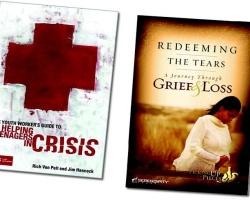The Youth Worker’s Guide to Helping Teenagers in Crisis
Rich Van Pelt (see roundtable article) and Jim Hancock unfold step-by-step plans for managing the fallout from all sorts of worst-case scenarios, from substance abuse to natural disasters. This comprehensive manual also includes action items geared to help prevent small crises from escalating into huge ones (Zondervan).
Helping the Struggling Adolescent: A Guide to Thirty-Six Common Problems for Counselors, Pastors, and Youth Workers
Les Parrott III has developed this practical handbook for counselors and youth workers that details common teenage problems from abuse to suicide. A counseling guide in the back of the book includes 43 Rapid Assessment Tests (Zondervan).
Help-My Kids Are Hurting: A Survival Guide to Working with Students in Pain
Marv Penner lays out a helpful guide to counseling. He includes things like how to become someone who can help, when to ask for assistance and critical mistakes to avoid (Zondervan).
Life Hurts God Heals
Group, Inc. has put together an entire curriculum to help youth workers create a ministry of healing. It includes leaders’ guides, student workbooks, DVDs, devotionals and promotional materials (http://www.group.com/).
Redeeming the Tears: Grief & Loss
This Bible study is an eight-week series from Serendipity that helps group leaders create a space for participants to talk about grief. Although the series isn’t designed specifically for adolescents, it is filled with ice-breakers, discussion guides and worksheets that will help just about anyone find a way to talk about difficult issues (LifeWay).
When Answers Aren’t Enough
Matt Rogers (see article in this issue) has written a book for leaders who feel like grief is “raining down” on them. As a Virginia Tech campus pastor, he tackles questions about how he struggled to find God’s goodness in the midst of overwhelming sadness (Zondervan).
www.CPYU.org
The Center for Parent/Youth Understanding Web site is one of the best when it comes to figuring out how to deal with teens in crisis. Not only do they have excellent articles about everything from abuse to violence, but they also have a number of resource pages, reading lists, research reviews and book reviews—all with helpful Web links.
www.Troubledwith.com
This Web site from Focus on the Family has extensive links to articles and resources dealing with issues ranging from bullying and depression to Internet issues and eating disorders.
www.Willowcreek.com
(keyword: tragedy)
Willow Creek’s Web site offers a number of helpful articles and resources designed to help churches respond to tragedy.
Help When it Hurts
This crisis-training program helps youth workers learn how to become involved in local “critical incidents.” This training is especially important for those who want to establish connections and credibility with local law enforcement and first responders (www.youthworkers.net/CrisisResponse/).
www.Hopeline.com
1-800-SUICIDE, as well as the Hopeline Web site offer contact information for certified crisis centers. While these centers are not necessarily faith-based, this is an important link for youth who may be contemplating suicide.
www.Griefnet.org
Griefnet offers almost 50 email support groups in their online community. It includes a moderated chat room for those who are grieving, lists of books, newsletters, survivor information and more.
www.BreaktheCycle.org
Break the Cycle, a non-profit, non-faithbased organization, is dedicated to educating and empowering youth regarding issues of dating and domestic violence. Their Web site includes information for educators, as well as ideas about where kids can go for help.
For local crisis referral centers, check your phone book using terms, such as “Counseling,” “Crisis Intervention,” “County Department of Health,” “Mental Health Services” or “Suicide Prevention.”




